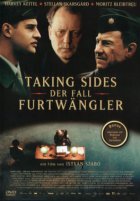
Taking Sides Page #10
- NOT RATED
- Year:
- 2001
- 108 min
- 526 Views
STEVE:
(playing with him)
Doesn't sound much of a trick to
me. Sounds like you made a deal.
FURTWÄNGLER
I made no deal!
STEVE:
I don't buy that.
FURTWÄNGLER
It's the truth.
Silence. Steve paces. Then suddenly turns on Furtwängler.
STEVE:
I keep hearing you helped a lot of
Jews to escape. How did you do
that?
FURTWÄNGLER
I don't remember in detail, there
were so many.
STEVE:
Did you call someone you knew?
FURTWÄNGLER
I may have, as... as I said, I
simply don't remember.
STEVE:
Let me me help you, then. You picked
up the phone and made a call -
(Mimes a telephone.)
'Hello, Adolf? Wilhelm speaking.
Listen, old pal, there's a Jew-boy
musician I want you to help. He
needs a permit to get to Paris.'
Emmi sticks her fingers in her ears and shuts her eyes
tight.
STEVE:
Or maybe you called Goebbels or
Goering? You were so close you
were in the same shithouse as them.
FURTWÄNGLER
May I ask a question?
STEVE:
Sure.
FURTWÄNGLER
When will my case be heard by the
Tribunal?
STEVE:
Your guess is as good as mine.
FURTWÄNGLER
I need to work. I need to make my
living. I live off the generosity
of friends...
STEVE:
Tough, tough!
FURTWÄNGLER
(now more and more
agitated)
Then why is it, please, that another
conductor who was actually a member
of the Party, who used to play the
Horst Wessel before his concerts,
has already been cleared and is
working again while I have to wait
and wait and wait?
STEVE:
I don't know, he wasn't my case.
Why did you escape to Switzerland
just before the war ended?
FURTWÄNGLER
It was because I learned that the
Gestapo was about to arrest me.
STEVE:
Why were they going to arrest you?
FURTWÄNGLER
I believe it was because of another
letter I'd written to Goebbels
lamenting the decline of musical
standards due to racial policies.
STEVE:
You didn't complain about the racial
policies, just about the musical
standards, is that right?
No response.
STEVE:
So, how did you learn that the
Gestapo was out to get you?
FURTWÄNGLER
During an enforced hour-long
interval because of a power failure
at a concert here in Berlin, Albert
Speer, the Minister of Armaments,
said to me, 'You look very tired
Dr. Furtwängler, you should go
abroad for a while.' I knew exactly
what he meant.
STEVE:
You sure knew a lot of people in
high places.
FURTWÄNGLER
It would be truer to say, I think,
that a lot of people in high places
knew me.
STEVE:
You were real close to all of them,
to Adolf, to Hermann, to Joseph,
to Baldur, and now Albert,
(flaring)
So, let's hear the truth, let's
come clean. What was your Party
number?
FURTWÄNGLER
If you are going to bully me like
this, Major, you had better do
your homework. You obviously have
no idea how impertinent and stupid
your questions are.
Steve is stung. His eyes narrow dangerously.
STEVE:
David, you remember I said I had a
question that he wouldn't be able
to answer? Well, I'm gonna ask it
now. You ready for this, Wilhelm?
It's a tough one. Why didn't you
get out right at the start when
Hitler came to power in 1933? Why
didn't you leave Germany?
No response.
STEVE:
I have a list of names here, people
in your profession, who got out in
'33. Bruno Walter, Otto Klemperer,
Arnold Schoenberg, Max Reinhardt...
Translation
Translate and read this script in other languages:
Select another language:
- - Select -
- 简体中文 (Chinese - Simplified)
- 繁體中文 (Chinese - Traditional)
- Español (Spanish)
- Esperanto (Esperanto)
- 日本語 (Japanese)
- Português (Portuguese)
- Deutsch (German)
- العربية (Arabic)
- Français (French)
- Русский (Russian)
- ಕನ್ನಡ (Kannada)
- 한국어 (Korean)
- עברית (Hebrew)
- Gaeilge (Irish)
- Українська (Ukrainian)
- اردو (Urdu)
- Magyar (Hungarian)
- मानक हिन्दी (Hindi)
- Indonesia (Indonesian)
- Italiano (Italian)
- தமிழ் (Tamil)
- Türkçe (Turkish)
- తెలుగు (Telugu)
- ภาษาไทย (Thai)
- Tiếng Việt (Vietnamese)
- Čeština (Czech)
- Polski (Polish)
- Bahasa Indonesia (Indonesian)
- Românește (Romanian)
- Nederlands (Dutch)
- Ελληνικά (Greek)
- Latinum (Latin)
- Svenska (Swedish)
- Dansk (Danish)
- Suomi (Finnish)
- فارسی (Persian)
- ייִדיש (Yiddish)
- հայերեն (Armenian)
- Norsk (Norwegian)
- English (English)
Citation
Use the citation below to add this screenplay to your bibliography:
Style:MLAChicagoAPA
"Taking Sides" Scripts.com. STANDS4 LLC, 2024. Web. 23 Dec. 2024. <https://www.scripts.com/script/taking_sides_403>.



Discuss this script with the community:
Report Comment
We're doing our best to make sure our content is useful, accurate and safe.
If by any chance you spot an inappropriate comment while navigating through our website please use this form to let us know, and we'll take care of it shortly.
Attachment
You need to be logged in to favorite.
Log In